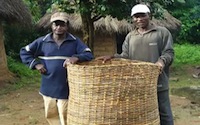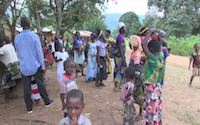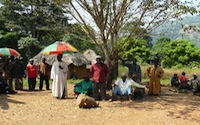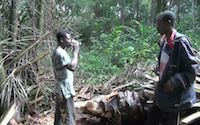Sociolinguistic profile and degree of language endangerment
Bezen is a marginalised and highly endangered language spoken in one village called Bezen (formerly: Kpwep) which has four quarters (Buhim, Kahang, Okung and Kunashin). It is located in the remote Furu-Awa Subdivision of the Menchum Division of the North West Region of Cameroon. Its population is approximately 450 (SIL, 2001). The language seems to have no significant dialectal variation.
Bezen has no official recognition, neither on national level nor on regional or divisional levels. Its first scientific recognition is as late as Breton & Fohtung’s linguistic atlas of Cameroon (1991), while slightly older surveys of Cameroonian languages such as Dieu & Renaud (1983) do not mention it at all.
Until now, Bezen remains totally undescribed. Apart from Brye’s sociolinguistic survey (2004) which contains a deficient 100-word list on Beezen and Akum, the only data available are exploratory elicitations conducted by Kießling, Good and Farrar (2007). Before now, no effort as relates to documentation had been envisaged by institutions such as SIL International, CABTAL (Cameroonian Association for Bible Translation and Literacy) or NACALCO (National Association of Cameroonian Language Committees).
The Bezen speech community is very small. It has no official recognition, its prestige is low with regard to locally dominating languages of wider communication such as Jukun and Cameroon Pidgin English (CPE). Its use is restricted to intra-ethnic domains and on a decline even there. In fact, language shift is affecting the population of this area, and coupled with the absence of intergenerational language transmission, subsequent language death is eminent.
Formal education is not carried out in the Bezen language. This situation has been aggravated by rural exodus of the youths to urban regions such as Wum and Bamenda in search of jobs and better living conditions. The government policy before now had not considered the integration of mother tongues into the educational curricular or introduction of mother tongue education at all. This however has been one of the reasons why there has been significant absence of literacy and literary materials in most of Cameroonian languages especially the marginalised ones.
The government attitude is mitigated. Although clearly stipulated in the Constitution that local languages and cultures should be promoted (Art 3, paragraph 2 of section 1), the preoccupation for long has been to ensure that every Cameroonian speaks, understands and writes the two official languages, French and English. Despite the government’s recent effort to indulge into mother tongue education in the educational system, Bezen, which does not have any demographic, socio-political or economic backing stands no change of being accorded a linguistic status in the sociolinguistic picture of Cameroon.
Bezen parents consider it good to encourage their children to learn Jukun and Cameroon Pidgin English as they believe this will ‘favour the child’ and enable the next generation to interact with the outsiders (Brye 2004: 6). There is also a tendency for parents to refrain from transmitting Bezen to their children at all, since they regard it as an obstacle to the acquisition of Jukun. Thus, Jukun could be seen to encroach upon Bezen in many domains of informal language use. Another factor which accelerates the resulting shift from Bezen to Jukun or CPE is the prevalent high frequency of interethnic marriage practised in this community.
Goals and objectives of the project
Especially the prospect of upcoming – radical, probably disruptive – changes in Bezen society (caused by the dam project on the river Katsina Ala) upgrades the urgency of this project which aims at an ethno-linguistic documentation of Bezen by providing a corpus of narrative and dialogic texts of various genres in a sustainable multi-media format that satisfies both practical and scientific concerns. Beyond providing an understanding of Bezen grammar, the project already contributes to boosting the self-esteem of Bezen people and to preserving the endangered cultural knowledge enshrined in their language.
References
Breton, Roland, Bikia Fohtung. 1991. Atlas administratif des langues nationales du Cameroun. Yaoundé and Paris: CERDOTOALA, ACCT.
Brye, Edward. 2004. A Rapid appraisal of Beezen. Ms. SIL International, 15pp.
Dieu, Michel, Patrick Renaud. 1983. Atlas linguistique du Cameroun, inventaire preliminaire. Paris: ACCT; Yaoundé: CERDOTOLA; Yaoundé: DGRST.
Gordon, Raymond G. Jr. 2005. Ethnologue: Languages of the World, 15th edition. Dallas: SIL International.
Lewis, M. Paul (ed.). 2009. Ethnologue: Languages of the World, 16th edition. Dallas: SIL International. Online version: http://www.ethnologue.com/.







